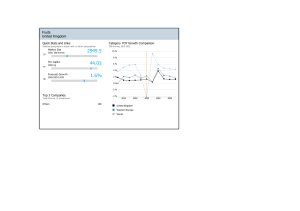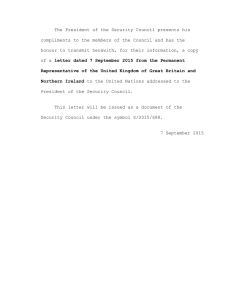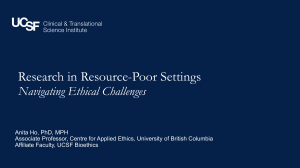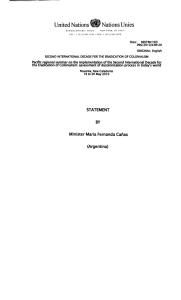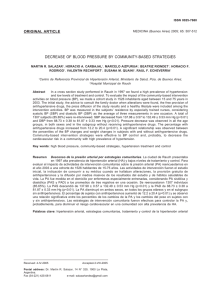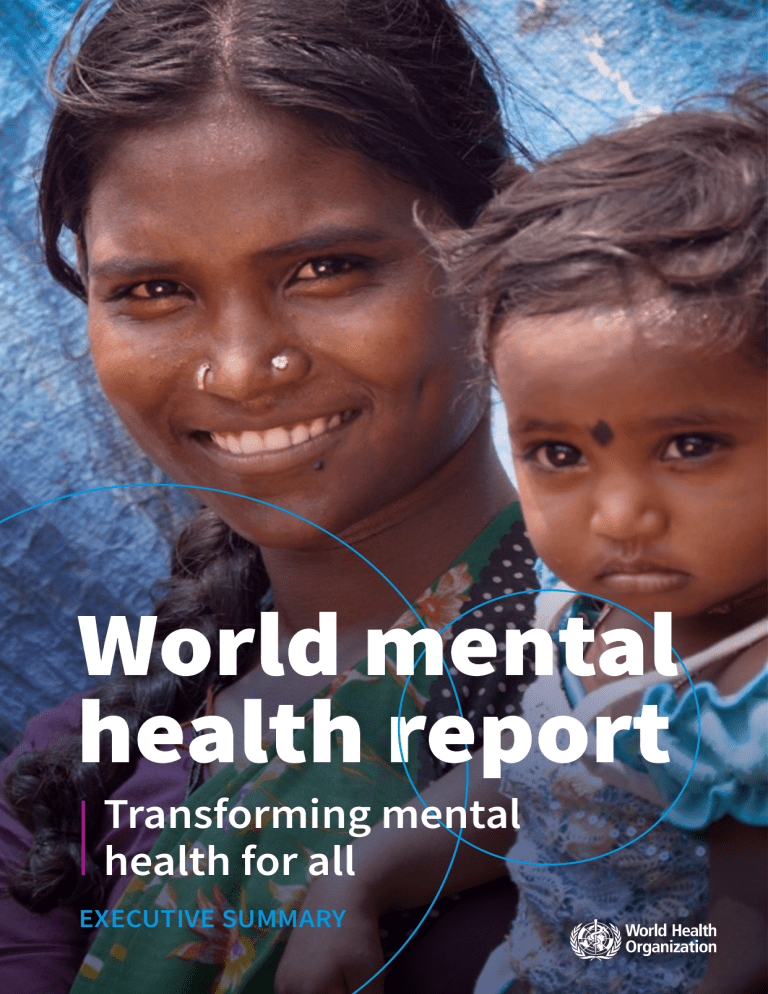
Transforming mental health for all EXECUTIVE SUMMARY Transforming mental health for all EXECUTIVE SUMMARY World mental health report: transforming mental health for all. Executive summary ISBN 978-92-4-005086-0 (electronic version) ISBN 978-92-4-005087-7 (print version) © World Health Organization 2022 Some rights reserved. This work is available under the Creative Commons Attribution-NonCommercial-ShareAlike 3.0 IGO licence (CC BY-NC-SA 3.0 IGO; https://creativecommons.org/licenses/by-nc-sa/3.0/igo). Under the terms of this licence, you may copy, redistribute and adapt the work for non-commercial purposes, provided the work is appropriately cited, as indicated below. In any use of this work, there should be no suggestion that WHO endorses any specific organization, products or services. The use of the WHO logo is not permitted. If you adapt the work, then you must license your work under the same or equivalent Creative Commons licence. If you create a translation of this work, you should add the following disclaimer along with the suggested citation: “This translation was not created by the World Health Organization (WHO). WHO is not responsible for the content or accuracy of this translation. The original English edition shall be the binding and authentic edition”. Any mediation relating to disputes arising under the licence shall be conducted in accordance with the mediation rules of the World Intellectual Property Organization (http://www.wipo.int/ amc/en/mediation/rules/). Suggested citation. World mental health report: transforming mental health for all. Executive summary. Geneva: World Health Organization; 2022. Licence: CC BY-NC-SA 3.0 IGO. Cataloguing-in-Publication (CIP) data. CIP data are available at http://apps.who.int/iris. Sales, rights and licensing. To purchase WHO publications, see http://apps.who.int/bookorders. To submit requests for commercial use and queries on rights and licensing, see https://www. who.int/copyright. Third-party materials. If you wish to reuse material from this work that is attributed to a third party, such as tables, figures or images, it is your responsibility to determine whether permission is needed for that reuse and to obtain permission from the copyright holder. The risk of claims resulting from infringement of any third-party-owned component in the work rests solely with the user. General disclaimers. The designations employed and the presentation of the material in this publication do not imply the expression of any opinion whatsoever on the part of WHO concerning the legal status of any country, territory, city or area or of its authorities, or concerning the delimitation of its frontiers or boundaries. Dotted and dashed lines on maps represent approximate border lines for which there may not yet be full agreement. The mention of specific companies or of certain manufacturers’ products does not imply that they are endorsed or recommended by WHO in preference to others of a similar nature that are not mentioned. Errors and omissions excepted, the names of proprietary products are distinguished by initial capital letters. All reasonable precautions have been taken by WHO to verify the information contained in this publication. However, the published material is being distributed without warranty of any kind, either expressed or implied. The responsibility for the interpretation and use of the material lies with the reader. In no event shall WHO be liable for damages arising from its use. Graphic design and layout. Café.art.br and Ara Johannes. Contents Foreword v Preface vii Acknowledgements viii Executive summary 1 iii World mental health report: transforming mental health for all. Executive summary iv Foreword As the world comes to live with, and learn from, the far-reaching effects of the COVID-19 pandemic, we must all reflect on one of its most striking aspects – the huge toll it has taken on people’s mental health. Rates of already-common conditions such as depression and anxiety went up by more than 25% in the first year of the pandemic, adding to the nearly one billion people who were already living with a mental disorder. At the same time, we must recognize the frailty of health systems attempting to address the needs of people with newly-presenting as well as pre-existing mental health conditions. Mental health is a lot more than the absence of illness: it is an intrinsic part of our individual and collective health and well-being. As this report shows, to achieve the global objectives set out in the WHO Comprehensive mental health action plan 2013–2030 and the Sustainable Development Goals, we need to transform our attitudes, actions and approaches to promote and protect mental health, and to provide and care for those in need. We can and should do this by transforming the environments that influence our mental health and by developing community-based mental health services capable of achieving universal health coverage for mental health. As part of these efforts, we must intensify our collaborative action to integrate mental health into primary health care. In so doing, we will reduce suffering, preserve people’s dignity and advance the development of our communities and societies. Our vision is a world where mental health is valued, promoted and protected; where mental health conditions are prevented; where anyone can exercise their human rights and access affordable, quality mental health care; and where everyone can participate fully in society free from stigma and discrimination. To achieve this ambitious transformation, a concerted and renewed effort is needed in all countries, whether they are rich or poor, stable or fragile, affected by emergencies or not. WHO will play its part as the lead agency for global health and will continue to work nationally and internationally to provide strategic leadership, evidence, tools and technical support. Ultimately, there is no health without mental health. Dr Tedros Adhanom Ghebreyesus Director-General World Health Organization v World mental health report: transforming mental health for all. Executive summary vi Preface Mental health conditions are very common in all countries of the world. Most societies and most health and social systems neglect mental health and do not provide the care and support people need and deserve. The result is that millions of people around the world suffer in silence, experience human rights violations or are negatively affected in their daily lives. This should not be the story of mental health, globally or in your country. And it does not have to be. This report argues for a transformation in mental health and shows that it is possible. Using findings from research and practice, it explores diverse options to deepen the value and commitment we give to mental health, to reshape environments that influence mental health, and to develop and strengthen community-based mental health services. Using examples of positive change from across the globe, this report shows that every country, no matter its situation, has many opportunities to significantly improve mental health for its adults and children. Throughout this report you will find narratives from people around the world with lived experience of mental health conditions. Their accounts show what effective health and social support looks like, how it can lead to recovery, and how this means different things to different people. And they tell of the suffering, stigma and social exclusion that happens in the absence of environments and services that protect and support mental health and that offer affordable, quality care. Ultimately, these stories are a reminder that investing in and transforming mental health means investing in people. Everyone has a right to mental health. Everyone deserves the chance to thrive. Dévora Kestel Director Department of Mental Health and Substance Use World Health Organization vii World mental health report: transforming mental health for all. Executive summary Acknowledgements Leadership This report was developed under the overall direction of Dévora Kestel, with coordination by Mark van Ommeren, of the of the World Health Organization (WHO) Department of Mental Health and Substance Use. Writing and editorial team Sian Lewis (London, United Kingdom of Great Britain and Northern Ireland), Melvyn Freeman (Johannesburg, South Africa), Mark van Ommeren (WHO), Dan Chisholm (WHO), Olivia Gascoigne Siegl (Birmingham, United Kingdom) and Dévora Kestel (WHO). WHO contributors and reviewers WHO Headquarters staff and consultants: Aemal Akhtar, Elaine Brohan, Alison Brunier, Ken Carswell, Rodrigo Cataldi, Mateo Cesari, Venkatraman Chandra-Mouli, Sudipto Chatterjee, Neerja Chowdhary, Natalie Drew, Tarun Dua, Batool Fatima, Alexandra Fleischmann, Stéfanie Fréel, Michelle Funk, Claudia Garcia-Moreno, Brandon Gray, Fahmy Hanna, Thiago Herick De Sa, Jang Hyobum, Kavitha Kolappa, Aiysha Malik, John Mahoney, Gergana Manolova, Vladimir Poznyak, Geoffrey Reed, Nathalie Roebbel, Alison Schafer, Nicoline Schiess, Katrin Seeher, Chiara Servili, Yuka Sumi, Maike van Niekerk and Inka Weissbecker. WHO staff in regions and countries: Florence Baingana (WHO Regional Office for Africa), Catarina Dahl (WHO Country Office for Brazil), Chencho Dorji (WHO Regional Office for South-East Asia), Jennifer Hall (WHO Country Office for Fiji), Matías Irarrázaval (WHO Regional Office for the Americas), Ledia Lazeri (WHO Regional Office for Europe), Renato Oliveira e Souza (WHO Regional Office for the Americas), Khalid Saeed (WHO Regional Office for the Eastern viii Mediterranean) and Martin Vandendyck (WHO Regional Office for the Western Pacific). External contributors and reviewers Advisory group: Fatma Charfi (University of Tunis El Manar, Tunis, Tunisia); Fiona Charlson (University of Queensland, Brisbane, Australia); Pim Cuijpers (Vrije Universiteit Amsterdam, Amsterdam Netherlands); Terdsak Detkong (Ministry of Public Health, Bangkok, Thailand); Julian Eaton (CBM and London School of Hygiene and Tropical Medicine, United Kingdom); Daniel Fung (International Association for Child and Adolescent Psychiatry and Allied Professions, Singapore); Grace Gatera (Kigali, Rwanda); Cecilia Guillén (En Primera Persona AC, Mexico City, Mexico); Saima Hossain (Shuchona Foundation, Dhaka, Bangladesh); Asma Humayun (Islamabad, Pakistan); Anne Lovell (French Institute of Health and Medical Research (INSERM), Paris, France); Nasser Loza (World Federation for Mental Health, Cairo, Egypt); Nino Makhashvili (Ilia State University, Tiblisi, Georgia); Roberto Mezzina (International Mental Health Collaborating Network, Trieste, Italy); Christian Montenegro (University of Exeter, Exeter, United Kingdom); Vikram Patel (Harvard Medical School, Boston, United States of America (USA)); Soumitra Pathare (Indian Law Society, Pune, India) and Ashwin Vasan (Fountain House, New York, USA). Contributors of lived experience narratives: Marie Abanga (Cameroon), Esenam Abra Drah (Ghana), Amira Ali Al-Jamal (Jordan), Benjamin Ballah (Liberia), Nour Awad (Lebanon), Dixoni Emmanuel (United Republic of Tanzania), Sandra Ferreira (South Africa), Regina Célia Freire da Silva (Brazil), Odireleng Kasale (Botswana), Steven Lawlor (United Kingdom), Enoch Li (China), Tamira Loewen (Canada), Joanna Lovón (Peru), Kat McIntosh (Trinidad and Tobago), Acknowledgements Lion Gai Meir (Israel), Eleni Misganaw (Ethiopia), Angelica Mkorongo (Zimbabwe), Mrs BN (Anonymous), Ntokozo Nyathi (Zimbabwe), Benny Prawira (Indonesia), Alejandra Rivera (Peru), Claudia Sartor (South Africa), Alexandra Schuster (United Kingdom), Olivia Gascoigne Siegl (United Kingdom), Charlene Sunkel (South Africa), Anders Timms (United Kingdom), Laura Van Tosh (USA), Sahar Vasquez (Belize), Larry White (Canada) and Zineb (Morocco). Other contributors and peer reviewers: Alastair Ager (Queen Margaret University, Edinburgh, United Kingdom); Esra Alataş (Ministry of Health, Ankara, Türkiye); Benjamin Ballah (Cultivation for Users’ Hope, Congo Town, Liberia); Corrado Barbui (University of Verona, Italy); Jonathan Campion (South London and Maudsley NHS Foundation Trust, London, United Kingdom); Odille Chang (Fiji National University, Suva, Fiji); Leonardo Cubillos (National Institute of Mental Health, Bethesda, USA); Michael Eddleston (University of Edinburgh, United Kingdom); Emma Ferguson (United Nations Children’s Fund (UNICEF), New York, USA); Alize Ferrari (University of Queensland, Brisbane, Australia); Kostas Fountoulakis (Aristotle University of Thessaloniki, Greece); Charlotte Hanlon (King’s College London, United Kingdom and University of Addis Ababa, Ethiopia); Helen Herrman (University of Melbourne, Australia); Zeinab Hijazi (UNICEF, New York, USA); Priscilla Idele (UN Executive Office of the Secretary-General, New York, USA); Lynne Jones (London School of Hygiene and Tropical Medicine, United Kingdom); René Keet (GGZ Noord-Holland-Noord, Alkmaar, the Netherlands); Christian Kieling (Federal University of Rio Grande do Sul, Porto Alegre, Brazil); Sarah Kline (United for Global Mental Health, London, United Kingdom); Brandon Kohrt (George Washington University, Washington, DC, USA); Sherianne Kramer (Amsterdam University College, the Netherlands); Joanna Lai (UNICEF, New York, USA); Patricia Landinez (UNICEF, New York, USA); Crick Lund (King’s College London, United Kingdom and University of Cape Town, South Africa); Mario Maj (University of Campania Luigi Vanvitelli, Napoli, Italy); Ana Maria Mantilla Herrera (University of Queensland, Brisbane, Australia); Simon Njuguna Kahonge (Ministry of Health, Nairobi, Kenya); Joseph Quoi (Ministry of Health, Monrovia, Liberia); Sarah Ramsay (Cambridge, United Kingdom); James Sale (United for Global Mental Health, London, United Kingdom); Damian Santomauro (University of Queensland, Brisbane, Australia); Palmira Fortunato dos Santos (Ministry of Health, Maputo, Mozambique); Benedetto Saraceno (NOVA University Lisbon, Portugal); Norman Sartorius (Association for the Improvement of Mental Health Programmes, Geneva, Switzerland); Shekhar Saxena (Harvard T H Chan School of Public Health, Boston, USA); Jamileh Shadid (University of Queensland, Brisbane, Australia); Beck Smith (Wellcome Trust, London, United Kingdom); Charlene Sunkel (Global Mental Health Peer Network, Johannesburg, South Africa); Angie Tarr (Ministry of Health, Monrovia, Liberia); Graham Thornicroft (King’s College London, United Kingdom); Wietse Tol (University of Copenhagen, Denmark); Peter Ventevogel (United Nations High Commissioner for Refugees, Geneva, Switzerland); Harvey Whiteford (University of Queensland, Brisbane, Australia); Miranda Wolpert (Wellcome Trust, London, United Kingdom); and Cynthia Zavala (University of Queensland, Brisbane, Australia). Financial support Swiss Agency for Development and Cooperation, Norwegian Agency for Development Cooperation and United States Agency for International Development. ix World mental health report: transforming mental health for all. Executive summary Overview of the World mental health report: transforming mental health for all MENTAL HEALTH TODAY: WHY DO WE NEED A TRANSFORMATION IN MENTAL HEALTH? 5 Protect human rights Laws, plans and policies Research and information Support development Political will Public interest Community action THE CASE FOR TRANSFORMATION: WHAT ARE THE BENEFITS OF CHANGE? Domestic finance External investment Community providers Self-care THE FOUNDATIONS: HOW DO WE BUILD AMBITION AND ACTION FOR CHANGE? Promote mental health for all Protect those at risk x 4 Health care workforce MENTAL HEALTH REFORM: HOW DO WE RESTRUCTURE SERVICES FOR CHANGE? 8 2 A growing crisis Advance public health 3 PRINCIPLES AND DRIVERS OF PUBLIC MENTAL HEALTH Determinants Core concepts 1 Inspire and inform change INTRODUCTION: A WORLD REPORT AND Provide mental health care in the community Suicide prevention Community services Children and adolescents In general health care Mental health at work Beyond the health sector PATHS TO TRANSFORMATION 6 7 Deepen value and commitment Reshape environments Scale up care for common conditions Deinstitutionalize care for severe conditions Strengthen mental health care Executive summary Chapter 1. Introduction A world report to inspire and inform change. Twenty years after WHO published its landmark The world health report 2001: mental health – new understanding, new hope the recommendations made then remain valid today. Yet many advances have been made. Interest in and understanding of mental health has increased. Many countries have established, updated and strengthened mental health policies or plans. Advocacy movements have amplified the voices of people with lived experience of mental health conditions. Informed by research, the field has advanced technically. Numerous practical, evidence-based mental health guidelines, manuals and other tools are now available for implementation. WHO Member States adopted the Comprehensive mental health action plan 2013–2030. They committed to meet global targets for improved mental health. These were focused on strengthening leadership and governance, community-based care, promotion and prevention, and information systems and research. But WHO’s latest analysis of country performance against the action plan shows that progress has been slow. For most of the world, the approach to mental health care remains very much business as usual. The result? Mental health conditions continue to exact a heavy toll on people’s lives, while mental health systems and services remain ill-equipped to meet people’s needs. In the meantime, global threats to mental health are ever present. Growing social and economic inequalities, protracted conflicts, violence and public health emergencies threaten progress towards improved well-being. Now, more than ever, business as usual for mental health simply will not do. This report is designed to inspire and inform the indisputable and urgent transformation required to ensure better mental health for all. While promoting a fit on one line approach, this report is especially written for decision-makers in the health sector. This includes ministries of health and other partners in the health sector who are generally tasked with developing mental health policy and delivering mental health systems and services. Business as usual for mental health simply will not do 1 World mental health report: transforming mental health for all. Executive summary Chapter 2. Principles and drivers in public mental health Mental health is critically important for everyone, everywhere. Mental health is an integral part of our general health and well-being and a basic human right. Having good mental health means we are better able to connect, function, cope and thrive. Mental health exists on a complex continuum, with experiences ranging from an optimal state of well-being to debilitating states of great suffering and emotional pain. People with mental health conditions are more likely to experience lower levels of mental well-being, but this is not always or necessarily the case. At any one time, a diverse set of individual, family, community and structural factors may combine to protect or undermine our mental health and shift our position on the mental health continuum. Although most people are remarkably resilient, people who are exposed to unfavourable circumstances – including poverty violence, and inequality – are at higher risk of experiencing mental health conditions. Risks can manifest themselves at all stages of life, but those that occur during developmentally sensitive periods, especially early childhood, are particularly detrimental. Protective factors similarly occur throughout our lives and serve to strengthen resilience. They include our individual social and emotional skills and attributes as well as positive social interactions, quality education, decent work, safe neighbourhoods and community cohesion, among others. Because the factors determining mental health are multisectoral, interventions to promote and protect mental health should also be delivered across multiple sectors. And when it comes to providing care, a multisectoral approach is 2 similarly needed because people with mental health conditions often require services and support that extend beyond clinical treatment. Mental health risks and protective factors can be found in society at different scales. Local threats heighten risk for individuals, families and communities. Global threats heighten risk for whole populations and can slow worldwide progress towards improved well-being. In this context, key threats today include: economic downturns and social polarization; public health emergencies; widespread humanitarian emergencies and forced displacement; and the growing climate crisis. Among its many impacts, the COVID-19 pandemic has created a global crisis for mental health, fuelling short- and long-term stresses and undermining the mental health of millions. For example, estimates put the rise in both anxiety and depressive disorders at more than 25% during the first year of the pandemic. At the same time, mental health services have been severely disrupted and the treatment gap for mental health conditions has widened. Mental health is an integral part of our general health and well-being and a basic human right Executive summary Chapter 3. World mental health today Mental health needs are high but responses are insufficient and inadequate. In all countries, mental health conditions are highly prevalent. About one in eight people in the world live with a mental disorder. The prevalence of different mental disorders varies with sex and age. In both males and females, anxiety disorders and depressive disorders are the most common. mental health conditions die on average 10 to 20 years earlier than the general population, often of preventable physical diseases. Suicide affects people and their families from all countries and contexts, and at all ages. Globally, there may be 20 suicide attempts to every one death, and yet suicide accounts for more than one in every 100 deaths. It is a major cause of death among young people. Overall, the economic consequences of mental health conditions are enormous. Productivity losses and other indirect costs to society often far outstrip health care costs. Economically, schizophrenia is the most costly mental disorder per person to society. Depressive and anxiety disorders are much less costly per person; but they are more prevalent, and so majorly contribute to overall national costs. Mental disorders are the leading cause of years lived with disability (YLDs), accounting for one in every six YLDs globally. Schizophrenia, which occurs in approximately 1 in 200 adults, is a primary concern: in its acute states it is the most impairing of all health conditions. People with schizophrenia or other severe In addition to being pervasive and costly, mental health conditions are also severely underserved. Mental health systems all over the world are marked by major gaps and imbalances in information and research, governance, resources and services. Other health conditions are often prioritized over mental health, and within mental 3 World mental health report: transforming mental health for all. Executive summary health budgets, community-based mental health care is consistently underfunded. On average, countries dedicate less than 2% of their health care budgets to mental health. More than 70% of mental health expenditure in middle-income countries still goes towards psychiatric hospitals. Around half the world’s population lives in countries where there is just one psychiatrist to serve 200 000 or more people. And the availability of affordable essential psychotropic medicines is limited, especially in low-income countries. Most people with diagnosed mental health conditions go completely untreated. 4 In all countries, gaps in service coverage are compounded by variability in quality of care. Several factors stop people from seeking help for mental health conditions, including poor quality of services, low levels of health literacy in mental health, and stigma and discrimination. In many places, formal mental health services do not exist. Even when they are available, they are often inaccessible or unaffordable. People will often choose to suffer mental distress without relief rather than risk the discrimination and ostracization that comes with accessing mental health services. Executive summary Chapter 4. Benefits of change Committing to mental health is an investment towards a better life and future for all. There are three main reasons to invest in mental health: public health, human rights and socioeconomic development. Investing in mental health for all advances public health. It can greatly reduce suffering and improve the health, quality of life, functioning and life expectancy of people with mental health conditions. Enhanced coverage and increased financial protection are fundamental steps towards closing the vast care gap and reducing inequities in mental health. To that end, including mental health in universal health coverage packages of essential services is vital. So too is integrating mental and physical health care, which improves accessibility, reduces fragmentation and duplication of resources and better meets people’s health needs. Investing in mental health is needed to stop human rights violations. Around the world, people with mental health conditions are frequently excluded from community life and denied basic rights. For example, they are not only discriminated against in employment, education and housing, but also do not enjoy equal recognition before the law. And too often they are subjected to human rights abuses by some of the very health services responsible for their care. By implementing internationally agreed human rights conventions, such as the Convention for the Rights of People with Disabilities, major advances can be made in human rights. Anti-stigma interventions – particularly social contact strategies through which people with lived experience help to shift attitudes and actions – can also reduce stigma and discrimination in the community. Investing in mental health can enable social and economic development. Poor mental health puts a brake on development by reducing productivity, straining social relationships and compounding cycles of poverty and disadvantage. Conversely, when people are mentally health, and live in supportive environments, they can learn and work well and contribute to their communities, to the benefit of all. Accumulated evidence shows that there is a core set of cost–effective interventions for priority conditions that are feasible, affordable and appropriate. These include school-based social and emotional learning programmes and regulatory bans on highly hazardous pesticides (to prevent suicides), as well as a range of clinical interventions as listed in the WHO UHC Compendium. Scaling up treatment for depression and anxiety provides a benefit–cost ratio of 5 to 1 5 World mental health report: transforming mental health for all. Executive summary Chapter 5. Foundations for change Transforming mental health starts with building the foundations for well-functioning mental health systems and services. In many ways, health system strengthening provides the foundations for change in mental health. It enables reorganization and scaling up of services and support. Key areas for action include: governance and leadership; finance; public awareness; and competencies for mental health care. financing. In practice, this means policy-makers and planners need to devote more funds to mental health. This is achieved either by getting additional resources from the state treasury or external funders, or by redistributing resources towards mental health, both within the health budget as well as across government. Global and national frameworks are critical to guide action on mental health and provide an enabling context for transformation. Legislation that complies with international human rights instruments is needed to protect and promote human rights. Given that the causes and needs of mental health cross sectors, it is essential that laws and policies aimed at improved mental health address all sectors. A competent and motivated workforce is a vital component of a well-functioning health system. All countries need to expand their specialized workforce for mental health, while simultaneously building mental health care competencies of other care providers and individuals. In particular, primary care staff and a wide range of community providers – including community workers and peers – need to be equipped with new skills to detect mental health conditions, provide basic interventions and support, refer people where necessary, and follow-up. Three types of political commitment – expressed, institutional and budgetary – are needed to drive the mental health agenda forward. Advocacy, evidence and political context can be hugely influential in fostering commitment and leadership. Humanitarian and public health emergencies in particular represent an obligation and opportunity for countries to invest in mental health. They offer unparalleled platforms for change. Strong public interest and understanding also drive improvement. People with lived experience are important agents of change to improve public awareness of mental health and acceptance of people with mental health conditions. To transform mental health services, commitment must be translated into action through appropriate 6 Beyond the mental health workforce, each of us can strengthen our individual skills and competencies in understanding and looking after our own mental health. Everyone in the community and the care system needs to support social inclusion for people living with mental health conditions, and to promote rights-based, person-centered, recovery-oriented care and support. In many settings, digital technologies offer promising tools, and can strengthen mental health systems by providing ways to inform and educate the public, train and support health care workers, deliver remote care, and enable self-help. Executive summary Chapter 6. Promotion and prevention for change Transforming mental health means strengthening multisectoral promotion and prevention for all. At all stages of life, promotion and prevention are required to enhance mental well-being and resilience, prevent the onset and impact of mental health conditions, and drive down the need for mental health care. There is increasing evidence that promotion and prevention can be cost–effective. Promotion and prevention interventions work by identifying the individual, social and structural determinants of mental health, and then intervening to reduce risks, build resilience and establish supportive environments for mental health. Interventions can be designed for individuals, specific groups or whole populations. Reshaping the determinants of mental health often requires action beyond the health sector, which makes effective promotion and prevention a multisectoral venture. The health sector can contribute significantly by embedding promotion and prevention efforts within health services; and by advocating, initiating and, where appropriate, facilitating multisectoral collaboration and coordination. Suicide prevention is an international priority, with a Sustainable Development Goal (SDG) target to reduce the suicide mortality rate by one third by 2030. To help countries reach this target, WHO has developed the LIVE LIFE approach to suicide prevention, which prioritizes four interventions with proven efficacy: limiting access to the means of suicide; interacting with the media for responsible reporting on suicide; fostering social and emotional life skills in adolescents; and early intervention for anyone affected by suicidal behaviours. Banning highly hazardous pesticides is a particularly inexpensive and cost–effective intervention. In countries with a high burden of pesticide self-poisonings, bans can lead to an immediate and clear drop in overall suicide rates, without agricultural loss. Infancy, childhood and adolescence are ages of both vulnerability and opportunity in mental health. Nurturing, caregiving and supportive learning environments can be 7 World mental health report: transforming mental health for all. Executive summary hugely protective of future mental health. On the other hand, adverse childhood experiences increase the risk of experiencing mental health conditions. Four key strategies for reducing risks and boosting protective factors include: developing and enforcing policies and laws that promote and protect mental health; supporting caregivers to provide nurturing care; implementing school-based programmes, including anti-bullying interventions; and improving the quality of environments in communities and digital spaces. School-based social and emotional learning programmes are among the most effective promotion strategies for countries at all income levels. Like schools, workplaces can be places of both opportunity and risk for mental health. Employers and governments have a responsibility to create 8 more work opportunities for people with mental health conditions, and to promote and protect all people’s mental health at work. For governments, that means implementing supportive legislation and regulations in human rights, labour and occupational health. For employers, WHO guidelines emphasize the importance of organizational interventions, manager mental health training and interventions for workers. 14% of the world’s adolescents (aged 10–19 years) lived with a mental disorder in 2019 Executive summary Chapter 7. Restructuring and scaling up care for impact Transforming mental health means strengthening community-based care for all in need. At the heart of mental health reform lies a major reorganization of mental health services. This must shift the locus of care for severe mental health conditions away from psychiatric hospitals towards community-based mental health services. At the same time, care for common conditions such as depression and anxiety must be scaled up. Both strategies are critical to improve coverage and quality for mental health care. Community-based mental health care is more accessible and acceptable than institutional care and delivers better outcomes for people with mental health conditions. People-centred, recovery-oriented and human rights-based care is essential. Community-based mental health care comprises a network of interconnected services that includes: mental health services integrated in general health care; community mental health services; and services that deliver mental health care in non-health settings and support access to key social services. Social and informal support delivered by community providers (e.g. community workers, peers) complement formal services and help ensure enabling environments for people with mental health conditions. Overall, there is no single model for organizing community-based mental health services that applies to all country contexts. Yet every country, no matter its resource constraints, can take steps to restructure and scale up mental health care for impact. Integrating mental health into general health services typically involves task-sharing with non-specialist health care providers or adding dedicated mental health staff and resources to primary and secondary health care. Task-sharing with primary health care providers has been shown to help reduce the treatment gap and increase coverage for priority mental health conditions. Task-sharing within disease-specific services such as HIV/AIDS or TB programmes can improve both physical and mental health outcomes. General hospitals and community mental health centres or teams provide secondary mental health care. They are often the cornerstone of community-based networks of services. They typically cater for a range of mental health conditions in adults, adolescents and children and blend clinical services with psychosocial rehabilitation and activities to promote social inclusion and participation in community life. Supported living services offer a valuable alternative to institutional care; and can include a mix of facilities with varying levels of support for different levels of dependency. On average psychiatric hospitals absorb 66% of national mental health budgets 9 World mental health report: transforming mental health for all. Executive summary At all levels of health care, peer support services provide an additional layer of support in which people use their own experiences to help each other – by sharing knowledge, providing emotional support, creating opportunities for social interaction, offering practical help or engaging in advocacy and awareness raising. 10 The responsibility for delivering community-based mental health care straddles multiple sectors. Complementing health interventions with key social services, including child protection and access to education, employment and social protection, is essential to enable people with mental health conditions achieve their recovery goals and live a more satisfying and meaningful life. Executive summary FIG. 1 Key shifts to transform mental health for all BEFORE 01 Limited value and attention to mental health 02 Widespread stigma and discrimination 03 Services are underfunded and underesourced 04 Little acknowledgement of the determinants of mental health 05 Few and fragmented promotion and prevention programmes 06 Predominantly biomedical approach to care 07 Care that ignores people’s own perspectives, priorities and human rights 08 Mental health care is only provided by the health sector 09 Fragmented services with uneven access and coverage 10 Care centred on psychiatric hospitals 11 Mental health care not available in primary health care 12 Community providers and informal support for mental health are ignored AFTER 01 Mental health is valued by all 02 Equal participation in society free from discrimination 03 Services are appropriately budgeted and resourced across sectors 04 Real and active multisectoral collaboration on the determinants of mental health 05 Strategic and well-functioning promotion and prevention programmes 06 A balanced, evidence-based biopsychosocial approach to care 07 Person-centred, human rights-based, recovery-oriented care 08 Mental health care is embedded in services across sectors 09 Coordinated services with universal health coverage 10 Network of community-based mental health services 11 Mental health care integrated in primary health care 12 Community providers and informal support are activated and strengthened to support people 11 World mental health report: transforming mental health for all. Executive summary Chapter 8. Conclusion Deepen commitment, reshape environments, and strengthen care to transform mental health. This report argues for a worldwide transformation towards better mental health for all (see Fig. 1). The WHO Comprehensive mental health action plan 2013–2030 represents a commitment from all countries to improve mental health and mental health care and provides a blueprint for action. No country is expected to fulfil every implementation option in the global action plan. And many countries do not have the resources to implement every action described in this report. But every country has ample opportunities to make meaningful progress towards better mental health for its population. Choosing what to focus on first will depend on country contexts, local mental health needs, other priorities and the existing state and structure of each mental health system. The evidence, experience and expertise presented in this report point to three key paths to transformation that can accelerate progress against the global action plan (see Fig. 2). These focus on shifting attitudes to mental health, addressing risks to mental health in our environment and strengthening systems that care for mental health. First, we must deepen the value and commitment we give to mental health as individuals, communities and governments; and match that value with more commitment, engagement and investment by all stakeholders, across all sectors. Second, we must reshape the physical, social 12 and economic characteristics of environments – in homes, schools, workplaces and the wider community – to better protect mental health and prevent mental health conditions. These environments need to give everyone an equal opportunity to thrive and reach the highest attainable level of mental health and well-being. Third, we must strengthen mental health care so that the full spectrum of mental health needs is met through a community-based network of accessible, affordable and quality services and support. Each path to transformation is a path towards better mental health for all. Together, they will lead us closer to a world in which mental health is valued, promoted and protected; where everyone has an equal opportunity to enjoy mental health and to exercise their human rights; and where everyone can access the mental health care they need. Individuals, governments, care providers, nongovernmental organizations, academics, employers, civil society and other stakeholders all have a part to play. It will take the combined efforts of us all to transform mental health. Executive summary FIG. 2 Three paths to transformation towards better mental health PATHS TO TRANSFORMATION DEEPEN VALUE AND COMMITMENT RESHAPE ENVIRONMENTS STRENGTHEN MENTAL HEALTH CARE Understand and appreciate intrinsic value Reshape physical, social and economic characteristics of different environments for mental health, including homes schools workplaces health care services communities natural environments Build community-based networks of services Promote social inclusion of people with mental health conditions Give mental and physical health equal priority Intensify engagement across sectors Step up investment in mental health Move away from custodial care in psychiatric hospitals Diversify and scale up care options Make mental health affordable and accessible for all Promote person-centred, human rights-based care Engage and empower people with lived experience 13 World mental health report: transforming mental health for all. Executive summary PHOTO CREDITS Cover: iStock.com / Vardhan. Page iv: Unsplash / Bennett Tobias. Page vi: WHO / A Bhatiasevi. Page 3: iStock.com / ZMS. Page 4: iStock.com / Edwin Tan. Page 7: Adobe Stock / Art_Photo. Page 8: WHO / Yoshi Shimizu. Page 10: WHO / NOOR / Sebastian Liste. Page 14: Adobe Stock / dundanim. ICONS Icons made by Freepik from www.flaticon.com 14 Mental health is critically important to everyone, everywhere. All over the world, mental health needs are high but responses are insufficient and inadequate. The World mental health report: transforming mental health for all is designed to inspire and inform better mental health for everyone everywhere. Drawing on the latest evidence available, showcasing examples of good practice from around the world, and voicing people’s lived experience, it highlights why and where change is most needed and how it can best be achieved. It calls on all stakeholders to work together to deepen the value and commitment given to mental health, reshape the environments that influence mental health, and strengthen the systems that care for mental health. Department of Mental Health and Substance Use World Health Organization 20 Avenue Appia 1211 Geneva 27, Switzerland https://www.who.int/health-topics/mental-health
